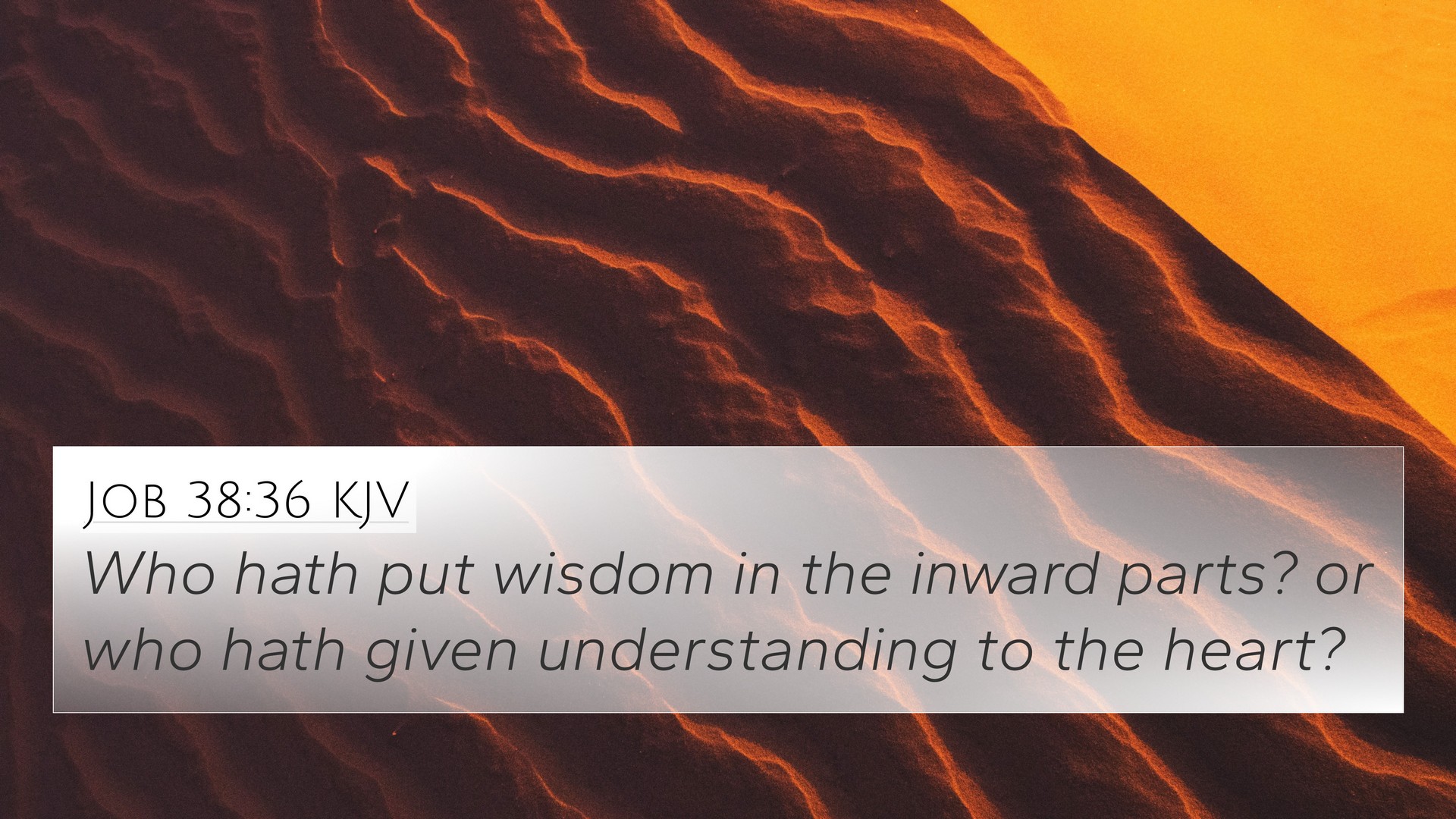Understanding Job 38:36
Job 38:36 reads: “Who has put wisdom in the inward parts? Or who has given understanding to the heart?” This verse comes from a section where God responds to Job out of the whirlwind, emphasizing the divine wisdom and power inherent in creation. Below is a summarized meaning and interpretation of this verse, incorporating insights from esteemed public domain commentaries.
Meaning and Insights
This verse invites reflection on the source of wisdom and understanding. As God questions Job, He highlights the limitations of human understanding in contrast to divine omniscience. Below are the key interpretations drawn from various commentaries:
- Matthew Henry: Henry emphasizes that God's challenge to Job is a reminder of the greatness of divine wisdom. The verse points to the fact that man's wisdom is limited and that true understanding comes from God alone. He notes that just as creation exhibited design, so too does wisdom fortify the heart, suggesting that understanding is a part of God’s intricate creation.
- Albert Barnes: Barnes points out that the rhetorical questions posed by God serve to highlight Job’s ignorance and the majesty of divine insight. He explains that God not only created the external world but also instilled wisdom within creatures, indicating that understanding and insight are gifts from God.
- Adam Clarke: Clarke suggests that this verse signifies the impossibility of comprehending God’s purpose without divine revelation. He connects the idea of wisdom in the heart with the innate knowledge that God bestows upon His creations, signifying His role as the giver of genuine understanding.
Bible Verse Cross-References
Job 38:36 resonates deeply within the biblical text, and its themes echo throughout Scripture. Notable cross-references that align with the essence of this verse include:
- Proverbs 2:6: “For the Lord gives wisdom; from his mouth come knowledge and understanding.”
- James 1:5: “If any of you lacks wisdom, let him ask of God, who gives to all liberally and without reproach, and it will be given to him.”
- Psalms 111:10: “The fear of the Lord is the beginning of wisdom; a good understanding have all those who do His commandments.”
- Isaiah 40:13-14: “Who has directed the Spirit of the Lord, or as His counselor has taught Him?”
- 1 Corinthians 1:25: “Because the foolishness of God is wiser than men, and the weakness of God is stronger than men.”
- Proverbs 3:5-6: “Trust in the Lord with all your heart, and lean not on your own understanding; in all your ways acknowledge Him, and He shall direct your paths.”
- Job 12:13: “With God are wisdom and strength; He has counsel and understanding.”
- Psalms 36:9: “For with You is the fountain of life; in Your light we see light.”
- Colossians 2:3: “In whom are hidden all the treasures of wisdom and knowledge.”
- Job 28:28: “And to man He said, ‘Behold, the fear of the Lord, that is wisdom, and to depart from evil is understanding.’”
Connections Between Bible Verses
The connections between Job 38:36 and other scriptures provide a robust framework for understanding wisdom as a divine attribute. The verses mentioned not only reinforce the message found in Job but also weave a thematic tapestry showing that the acquisition of wisdom and understanding is fundamentally linked to one’s relationship with God.
For instance, Proverbs 2:6 directly affirms that wisdom is a divine gift. The emphasis on asking God for wisdom in James 1:5 aligns with the notion that humans need to seek divine assistance to grasp true understanding. This correlates with Job’s situation, where he seeks answers to his suffering but is reminded of God's overarching wisdom.
Thematic Bible Verse Connections
The themes of wisdom and understanding as divine gifts recurs throughout the Old and New Testaments. This suggests a broader theological point: that human wisdom is inherently inadequate without divine revelation and assistance. The parallels drawn from various parts of the Bible exhibit a unity in message regarding God's omniscience and the believer's dependence on Him for true understanding.
Thus, as one engages in a comparative Bible verse analysis, the interconnectedness of God’s wisdom permeates through the Scriptures, inviting deep exploration into how these verses inform one another and build a comprehensive understanding of divine wisdom.
How to Use Bible Cross-References
Utilizing tools for Bible cross-referencing can greatly enhance one's understanding of any scripture. Here’s how one might approach it:
- Identify Key Themes: Begin by identifying the primary themes in Job 38:36—namely, wisdom and understanding.
- Utilize a Bible Concordance: A Bible concordance can help find verses related to these themes quickly.
- Engage in Cross-Reference Bible Study: Look for verses that either define or demonstrate the aspects of wisdom and understanding.
- Consider Context: When analyzing the connections, consider the context in which each verse appears to grasp the broader messages.
- Apply Insights: Apply insights from the interpretations of these verses to your life or study of the Bible.
Conclusion
Job 38:36 serves not merely as a rhetorical question but as a profound declaration of God's divine wisdom and the limitations of human understanding. Through the examination of cross-references, themes, and insights from established commentaries, we gain a richer comprehension of this verse's significance within the broader narrative of Scripture. It encourages believers to continually seek wisdom from God, acknowledging that true understanding is a divine gift to be pursued through faith and humility.












